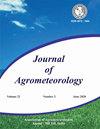Climate change adaptation and mitigation in Indian agriculture
Q3 Agricultural and Biological Sciences
引用次数: 0
Abstract
Climate change poses significant challenges to Indian agriculture, impacting crop yields, water availability, and overall food security. To address these challenges, a combination of adaptation and mitigation strategies is crucial. Adaptation measures involve adjusting agricultural practices to changing climate conditions, such as altering planting schedules, implementing water-saving techniques, and promoting resilient crop varieties. Mitigation strategies focus on reducing greenhouse gas emissions from agricultural activities, like adopting sustainable farming practices and enhancing carbon sequestration in soils. In India, the integration of adaptation and mitigation efforts is essential to enhance the resilience of farmers and agricultural systems to climate change impacts while contributing to global climate goals. By combining traditional knowledge with modern scientific approaches, Indian agriculture can navigate the complexities of climate change, ensuring sustainable food production and livelihood security for millions of farmers across the country. A concerted effort involving policymakers, researchers, extension workers, and farming communities is vital to bolster the resilience of Indian agriculture while contributing to global climate change mitigation efforts. Effective extension services are paramount for educating farmers and ensuring widespread adoption of these strategies. By prioritizing both adaptation and mitigation, Indian agriculture can navigate the challenges of climate change and ensure long-term food security.印度农业适应和缓解气候变化的情况
气候变化给印度农业带来了重大挑战,影响到作物产量、供水和整体粮食安全。为应对这些挑战,必须将适应和减缓战略结合起来。适应措施包括调整农业做法以适应不断变化的气候条件,如改变种植计划、实施节水技术和推广抗逆性强的作物品种。减缓战略侧重于减少农业活动产生的温室气体排放,如采用可持续的耕作方法和加强土壤固碳。在印度,要提高农民和农业系统抵御气候变化影响的能力,同时为实现全球气候目标做出贡献,就必须将适应和减缓工作结合起来。通过将传统知识与现代科学方法相结合,印度农业可以驾驭复杂的气候变化,确保全国数百万农民的可持续粮食生产和生计安全。政策制定者、研究人员、推广人员和农业社区齐心协力,对于增强印度农业的抗灾能力,同时为全球气候变化减缓工作做出贡献至关重要。有效的推广服务对于教育农民和确保广泛采用这些战略至关重要。通过优先考虑适应和减缓,印度农业可以应对气候变化的挑战,确保长期粮食安全。
本文章由计算机程序翻译,如有差异,请以英文原文为准。
求助全文
约1分钟内获得全文
求助全文
来源期刊

Journal of Agrometeorology
农林科学-农艺学
CiteScore
1.40
自引率
0.00%
发文量
95
审稿时长
>12 weeks
期刊介绍:
The Journal of Agrometeorology (ISSN 0972-1665) , is a quarterly publication of Association of Agrometeorologists appearing in March, June, September and December. Since its beginning in 1999 till 2016, it was a half yearly publication appearing in June and December. In addition to regular issues, Association also brings out the special issues of the journal covering selected papers presented in seminar symposia organized by the Association.
 求助内容:
求助内容: 应助结果提醒方式:
应助结果提醒方式:


